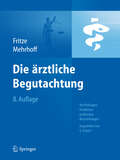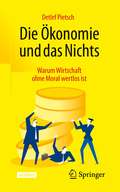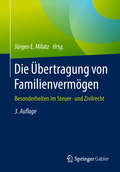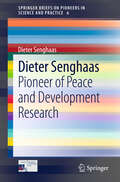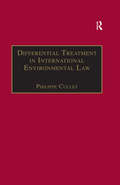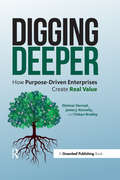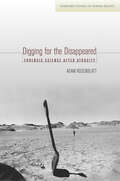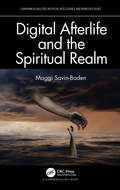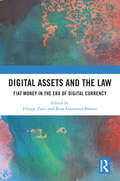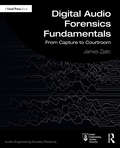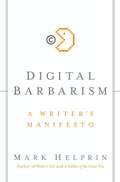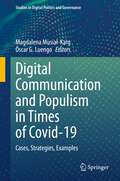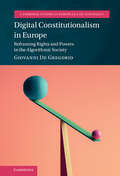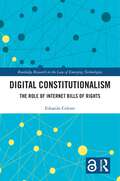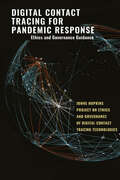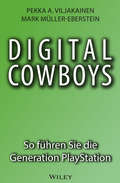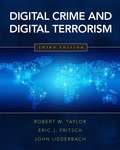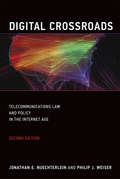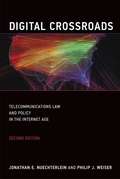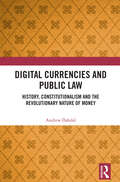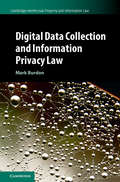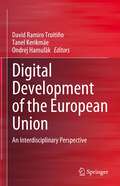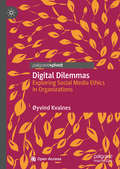- Table View
- List View
Die Ärztliche Begutachtung
by E. Fritze Jürgen Fritze Friedrich MehrhoffDie Erstellung eines medizinisches Gutachtens erfordert ein enormes Fachwissen von den einzelnen Fachdisziplinen. Das Standardwerk für ärztliche Gutachter erscheint nun in der 8., komplett aktualisierten Auflage und gilt als unverzichtbares Nachschlagewerk: - Anordnung der medizinischen Kapitel nach Organsystemen - Konsequente Strukturierung nach Epidemiologie, Kernsymptomenm Ätiopathogenese, Therapie option und Prognose - Angaben zur Evidenz und Leistungsfähigkeit von Menschen gemäß der ICF - Umfangreiches Stichwortverzeichnis zum Nachschlagen Es bietet Ärzten als Gutachter, Sachverständige und Berater der sozialrechtlichen Institutionen, Gerichte und Versicherungen gutachtliches Wissen und umfassende Übersicht über die rechtlichen Voraussetzungen und das Fachwissen aller medizinischen Fachgebiete - von der Frage der Berentung wegen Erwerbsminderung und den Berufskrankheiten über die Arzthaftung bis zur Frage der Schuldfähigkeit.
Die Ökonomie und das Nichts: Warum Wirtschaft ohne Moral wertlos ist
by Detlef PietschDie Corona-Pandemie hat uns eindringlich gezeigt: Ethische Fragen werden in der Ökonomie immer wichtiger. Der Lockdown zum gesundheitlichen Schutz der Bevölkerung hat die ökonomischen Aktivitäten notwendigerweise mehrheitlich heruntergefahren. Die Gesundheit der Bevölkerung musste gegen das ökonomische Wohl abgewogen werden. Bereits vor der Corona-Krise war die moderne Ökonomie zunehmend mit wirtschaftsethischen Problemen beschäftigt: Die stärkere Verzahnung von Ökonomie und Ökologie, die zunehmende Ungleichheit innerhalb der Bevölkerung und zwischen den Ländern, die Folgen der Globalisierung und jüngst der Digitalisierung. Nachdem Detlef Pietsch in seinen letzten beiden Büchern „Eine Reise durch die Ökonomie“ und „Prinzipien moderner Ökonomie“ die vergangenen und aktuellen ökonomischen Herausforderungen erläutert hat, diskutiert er nun die drängendsten wirtschaftsethischen Fragestellungen. Dabei werden die wesentlichen ethischen Theorien der Vergangenheit als Grundlage zur Einschätzung wirtschaftsethischer Aktivitäten allgemeinverständlich aufbereitet.
Die Übertragung von Familienvermögen
by Jürgen E. MilatzZu unterschiedlichen Zeitpunkten und aus verschiedenen Anlässen stellen sich, insbesondere aufgrund aktueller wirtschaftlicher und steuerlicher Entwicklungen, für viele Privatpersonen teils sehr komplexe Fragen ihrer Vermögensnachfolge. Die Übertragung von Vermögenswerten wie Immobilien, Gesellschaftsanteilen oder Kapitalvermögen innerhalb der Familie ist eine Maßnahme, um sich, Ehepartner und die nachkommenden Generationen zu versorgen und das Familienvermögen zu sichern. Die Übertragung zu Lebzeiten ermöglicht dabei oft eine gezieltere Steuerung als im Erbfall. Mit vielen Beispielen und Hinweisen zur Steueroptimierung werden die zahlreichen infrage kommenden Übertragungsformen von Privatvermögen an Familienangehörige zu Lebzeiten erläutert.Für die 3. Auflage wurde das Buch überarbeitet und umfassend aktualisiert.
Dietary Supplement Regulation in the United States
by Taylor C. Wallace Douglas Mackay Rend Al-Mondhiry Haiuyen Nguyen James C. GriffithsContrary to the common belief that dietary supplements are "unregulated" in the United States, nutrients and other dietary ingredient-containing products have been regulated in this country for a little over a century at least in some capacity, initially through the Pure Food and Drug Act (PFDA) of 1906 and culminating with the many anticipated regulations to be implemented following the recent enactment of the Food Safety Modernization Act of 2010 (FSMA). The goal of this brief is to review and discuss the current statutes and regulations surrounding the ingredients, manufacturing standards, safety, and labeling of dietary supplements for the purpose of protecting consumers.
Dieter Senghaas
by Dieter SenghaasDieter Senghaas, professor emeritus of international relations, University of Bremen, was one of most innovative contemporary German social scientists, with major contributions on peace and development research and on music and peace. He was awarded many prizes: the International Peace Research Award (1987), Göttingen Peace Prize (1999), Culture and Peace Prize of the Villa Ichon in Bremen (2006), and the Leopold-Kohr Prize of the Austrian Ministry of Science and Research (2010). In addition to his autobiographic notes and his selected bibliography, this book offers a global audience five key texts by D. Senghaas (1974-2009): Towards an Analysis of Threat Policy in International Relations; Friedrich List and the Basic Problems of Development; Developing the Definitions of Perpetual Peace ('para pacem'): Through What and How is Peace Constituted Today?; Sounds of Peace: On Peace Fantasies and Peace Offerings in Classical Music; and Enhancing Human Rights - A Contribution to Viable Peace.
Differential Treatment in International Environmental Law
by Philippe CulletThis book is a comprehensive study of differential treatment for developing countries in international environmental law. It offers a compelling analysis of the legal dimension of the relationship between developed and developing countries in the environmental field and beyond. It first critically examines the principle of legal equality of states and then explores the conceptual framework behind the notion of differential treatment in international law and its relevance in bringing about substantive equality. The book examines the development of differentiation in international environmental law, considers its application in various environmental treaties and evaluates the legal status of existing differential norms. It also examines the contribution of differentiation to the implementation of environmental treaties and the extent to which differential treatment fosters the decentralization of international environmental policy making. It is an indispensable resource for all actors involved in environmental law and policy making, scholars and students.
Diffusive Gradients in Thin-Films for Environmental Measurements (Cambridge Environmental Chemistry Series)
by William DavisonThe diffusive gradients in thin-films (DGT) technique is a means of measuring the concentration and speciation of metals in natural waters. Edited by one of the pioneers of the technique, this unique volume provides a complete and authoritative guide to the theory and applications of DGT. The book includes explanations of the fundamental principles of DGT, accessible to readers with a modest background in chemistry, as well as more advanced chapters that provide a thorough treatment of the physical and chemical dynamics of this technique and evaluate how well it mimics the biological uptake process. Chapters on natural waters, soils and sediments illustrate the applications of DGT, and detailed instructions are included on how to use DGT in practice. Combining the fundamentals of DGT with more advanced principles, this is an indispensable text for students, researchers and professional scientists interested in the chemistry of natural waters, soils and sediments. Provides a coherent and detailed account of the applications and uses of this valuable technique, ensuring that readers are fully initiated into all aspects of this emerging tool Edited by a world-leading expert on DGT, ensuring firsthand information and accurate, up-to-date research Includes a chapter on practical uses of DGT encouraging the reader to master this technique themselves, aiding the readers' own research and furthering their understanding of these processes on a practical level
Digging Deeper: How Purpose-Driven Enterprises Create Real Value
by Dietmar Sternad James J. Kennelly Finbarr BradleyWhat is the primary purpose of business? The standard answer is ‘making profits,’ but some visionary entrepreneurs and leaders fundamentally disagree. Instead of just making money, they choose instead to “dig deeper” and make a difference through creating real value – improving the lives of others even as they find deeper meaning in their own. These leaders build enterprises that provide identity and a sense of purpose, create positive relationships and a place to learn and thrive, embed sustainability in all that they do, and strive to improve the quality of life of all of their stakeholders. Although not their primary focus, they also make healthy profits, as their unique approach to value creation provides them with a sustainable competitive edge.Digging Deeper is a book full of inspiring stories that illustrate that there is an alternative to a myopic and narrow capitalism that trades in inequalities, exploitation, collective burnout and negative consequences for our shared natural environment. Remarkable examples from all over the world vividly demonstrate how enterprises can create real value through focusing on what the authors call the 6 Ls: long-term orientation, lasting relationships, local roots, limits recognition, developing a learning community and taking leadership responsibility seriously in its very best sense.Digging Deeper liberates the term “value” from the tight chains in which the global financial community has bound it and demonstrates that businesses can contribute to a better life for all ‒ if their leaders can go beyond viewing enterprises as single-purpose money-making machines and develop purpose-driven enterprises that create real value for all.
Digging for the Disappeared: Forensic Science after Atrocity
by Adam RosenblattThe mass graves from our long human history of genocide, massacres, and violent conflict form an underground map of atrocity that stretches across the planet's surface. In the past few decades, due to rapidly developing technologies and a powerful global human rights movement, the scientific study of those graves has become a standard facet of post-conflict international assistance. Digging for the Disappeared provides readers with a window into this growing but little-understood form of human rights work, including the dangers and sometimes unexpected complications that arise as evidence is gathered and the dead are named. Adam Rosenblatt examines the ethical, political, and historical foundations of the rapidly growing field of forensic investigation, from the graves of the "disappeared" in Latin America to genocides in Rwanda and the former Yugoslavia to post-Saddam Hussein Iraq. In the process, he illustrates how forensic teams strive to balance the needs of war crimes tribunals, transitional governments, and the families of the missing in post-conflict nations. Digging for the Disappeared draws on interviews with key players in the field to present a new way to analyze and value the work forensic experts do at mass graves, shifting the discussion from an exclusive focus on the rights of the living to a rigorous analysis of the care of the dead. Rosenblatt tackles these heady, hard topics in order to extend human rights scholarship into the realm of the dead and the limited but powerful forms of repair available for victims of atrocity.
Digital Afterlife and the Spiritual Realm (Chapman & Hall/CRC Artificial Intelligence and Robotics Series)
by Maggi Savin-BadenFew religious leaders have examined the potential for the positive impact of digital media and digital immortality creation in religious contexts. It is evident that there have been recent moves away from traditional funeral services focusing on the transition of the deceased into the future world beyond, towards a rise of memorial content within funerals and commemorative events. This has heralded shifts in afterlife beliefs by replacing them, to all intents and purposes, by attitudes to this life. Digital Afterlife and the Spiritual Realm explores the ways in which digital media and digital afterlife creation affects social and religious understandings of death and the afterlife. Features Understands the impact of digital media on those living and those working with the bereaved Explores the impact of digital memorialisation post death Examines the ways in which digital media may be changing conceptions and theologies of death For many people, digital afterlife and the spiritual realm largely remains an area that is both inchoate and confusing. This book will begin to unravel some of this bafflement.
Digital Assets and the Law: Fiat Money in the Era of Digital Currency (Routledge-Giappichelli Studies in Law)
by Filippo Zatti and Rosa Giovanna BarresiThis book delves into the intricacies of digital assets. With the increasing reliance on crypto and the potential adoption of digital currencies by central banks, our monetary system is at a critical point. The importance of taking the next step has become even more stringent, as evidenced by this systematic scientific reconstruction.Divided into five concentric parts, the book starts with a historical, technical and financial introduction to digital assets. It then explores the changing role of central banking and monetary economics in the upcoming era. Finally, it focuses on the broad legal issues arising from the new digital landscape, not shying away from exploring forward-thinking solutions and policies for the future.With the contributions of prominent international experts in the field, this collection supplies a transdisciplinary analysis based on the belief that complex phenomena can only be handled by complex solutions. This groundbreaking work aims to be more than just an academic treatise; it is a must-read for students, scholars, financial professionals, and all those who want to understand the emerging digital currency reality that many have yet to fully recognise.
Digital Audio Forensics Fundamentals: From Capture to Courtroom (Audio Engineering Society Presents)
by James ZjalicDigital Audio Forensics Fundamentals offers an accessible introduction to both the theory and practical skills behind this emerging field of forensic science. Beginning with an overview of the history of the discipline, the reader is guided through forensic principles and key audio concepts, before being introduced to practical areas such as audio enhancement, audio authentication, and the presentation of reports. Covering all aspects of audio forensics from the capture to the courtroom, this book is pivotal reading for beginners entering the field, as well as experienced professionals looking to develop their knowledge of the practice.
Digital Barbarism
by Mark HelprinWorld-renowned novelist Mark Helprin offers a ringing Jeffersonian defense of private property in the age of digital culture, with its degradation of thought and language, and collectivist bias against the rights of individual creators. Mark Helprin anticipated that his 2007 New York Times op-ed piece about the extension of the term of copyright would be received quietly, if not altogether overlooked. Within a week, the article had accumulated 750,000 angry comments. He was shocked by the breathtaking sense of entitlement demonstrated by the commenters, and appalled by the breadth, speed, and illogic of their responses. Helprin realized how drastically different this generation is from those before it. The Creative Commons movement and the copyright abolitionists, like the rest of their generation, were educated with a modern bias toward collaboration, which has led them to denigrate individual efforts and in turn fueled their sense of entitlement to the fruits of other people's labors. More important, their selfish desire to "stick it" to the greedy corporate interests who control the production and distribution of intellectual property undermines not just the possibility of an independent literary culture but threatens the future of civilization itself.
Digital Communication and Populism in Times of Covid-19: Cases, Strategies, Examples (Studies in Digital Politics and Governance)
by Magdalena Musiał-Karg Óscar G. LuengoThis book examines different dimensions of digital communication and populism in times of the COVID-19 pandemic. While doing so, it discusses views, opinions, and research results regarding the conditions, experiences, constraints, benefits, and challenges related to the topic - not only using theoretical and methodological approaches but also practical perspectives. The COVID-19 (SARS-CoV-2) pandemic significantly accelerated the technological revolution presenting many social, economic, and political challenges, as it pushed the world into cyberspace to ensure social distancing. At the same time, many populist protests expressed in the digital public sphere massively gained importance during the lockdowns. As a result, one of the most significant consequences of using electronic tools is not only greater e-participation of citizens, but - especially evident through elections during a pandemic - even greater transfer of political communication and election campaigns into the space of new media. The book broadly analyses various contexts of digitalization of communication processes and populist politics from both theoretical and empirical perspectives in various case studies on the digitalization of information, communication, or participation processes during the COVID-19 pandemic in selected European countries and beyond. This book will appeal to students, researchers, and scholars of political communication, political science, electoral studies, digital politics, and democracy, as well as policy-makers interested in a better understanding of digital communication and populism during the Covid-19 pandemic.
Digital Constitutionalism in Europe: Reframing Rights and Powers in the Algorithmic Society (Cambridge Studies in European Law and Policy)
by Giovanni De GregorioThis book is about rights and powers in the digital age. It is an attempt to reframe the role of constitutional democracies in the algorithmic society. By focusing on the European constitutional framework as a lodestar, this book examines the rise and consolidation of digital constitutionalism as a reaction to digital capitalism. The primary goal is to examine how European digital constitutionalism can protect fundamental rights and democratic values against the charm of digital liberalism and the challenges raised by platform powers. Firstly, this book investigates the reasons leading to the development of digital constitutionalism in Europe. Secondly, it provides a normative framework analysing to what extent European constitutionalism provides an architecture to protect rights and limit the exercise of unaccountable powers in the algorithmic society. This title is also available as open access on Cambridge Core.
Digital Constitutionalism: The Role of Internet Bills of Rights (Routledge Research in the Law of Emerging Technologies)
by Edoardo CelesteInvestigating the impact of digital technology on contemporary constitutionalism, this book offers an overview of the transformations that are currently occurring at constitutional level, highlighting their link with ongoing societal changes. It reconstructs the multiple ways in which constitutional law is reacting to these challenges and explores the role of one original response to this phenomenon: the emergence of Internet bills of rights. Over the past few years, a significant number of Internet bills of rights have emerged around the world. These documents represent non-legally binding declarations promoted mostly by individuals and civil society groups that articulate rights and principles for the digital society. This book argues that these initiatives reflect a change in the constitutional ecosystem. The transformations prompted by the digital revolution in our society ferment under a vault of constitutional norms shaped for ‘analogue’ communities. Constitutional law struggles to address all the challenges of the digital environment. In this context, Internet bills of rights, by emerging outside traditional institutional processes, represent a unique response to suggest new constitutional solutions for the digital age. Explaining how constitutional law is reacting to the advent of the digital revolution and analysing the constitutional function of Internet Bills of Rights in this context, this book offers a global comparative investigation of the latest transformations that digital technology is generating in the constitutional ecosystem and highlights the plural and multilevel process that is contributing to shape constitutional norms for the Internet age.
Digital Contact Tracing for Pandemic Response: Ethics and Governance Guidance
by Jeffrey Kahn; Johns Hopkins Project on Ethics and Governance of Digital Contact Tracing TechnologiesAs nations race to hone contact-tracing efforts, the world's experts consider strategies for maximum transparency and impact.As public health professionals around the world work tirelessly to respond to the COVID-19 pandemic, it is clear that traditional methods of contact tracing need to be augmented in order to help address a public health crisis of unprecedented scope. Innovators worldwide are racing to develop and implement novel public-facing technology solutions, including digital contact tracing technology. These technological products may aid public health surveillance and containment strategies for this pandemic and become part of the larger toolbox for future infectious outbreak prevention and control. As technology evolves in an effort to meet our current moment, Johns Hopkins Project on Ethics and Governance of Digital Contact Tracing Technologies—a rapid research and expert consensus group effort led by Dr. Jeffrey P. Kahn of the Johns Hopkins Berman Institute of Bioethics in collaboration with the university's Center for Health Security—carried out an in-depth analysis of the technology and the issues it raises. Drawing on this analysis, they produced a report that includes detailed recommendations for technology companies, policymakers, institutions, employers, and the public. The project brings together perspectives from bioethics, health security, public health, technology development, engineering, public policy, and law to wrestle with the complex interactions of the many facets of the technology and its applications.This team of experts from Johns Hopkins University and other world-renowned institutions has crafted clear and detailed guidelines to help manage the creation, implementation, and application of digital contact tracing. Digital Contact Tracing for Pandemic Response is the essential resource for this fast-moving crisis.Contributors: Joseph Ali, JD; Anne Barnhill, PhD; Anita Cicero, JD; Katelyn Esmonde, PhD; Amelia Hood, MA; Brian Hutler, Phd, JD; Jeffrey P. Kahn, PhD, MPH; Alan Regenberg, MBE; Crystal Watson, DrPH, MPH; Matthew Watson; Robert Califf, MD, MACC; Ruth Faden, PhD, MPH; Divya Hosangadi, MSPH; Nancy Kass, ScD; Alain Labrique, PhD, MHS, MS; Deven McGraw, JD, MPH, LLM; Michelle Mello, JD, PhD; Michael Parker, BEd (Hons), MA, PhD; Stephen Ruckman, JD, MSc, MAR; Lainie Rutkow, JD, MPH, PhD; Josh Sharfstein, MD; Jeremy Sugarman, MD, MPH, MA; Eric Toner, MD; Mar Trotochaud, MSPH; Effy Vayena, PhD; Tal Zarsky, JSD, LLM, LLB
Digital Cowboys: So führen Sie die Generation Playstation
by Pekka A. Viljakainen Mark Müller-EbersteinSie werden die Kultur der Unternehmen schneller verändern, als alle Generationen vor ihnen. Die Digital Cowboys sind in den Unternehmen die Leistungsträger von morgen. Als Digital Natives sind sie mit Social Media und modernen Technologien aufgewachsen. Diese Generation hat ihre eigene Sprache, ihre eigenen Werte und Besonderheiten. Doch wie führt man die Generation Playstation? Kann man sie überhaupt führen oder spielen die Online-Individualisten doch nur nach ihren eigenen Regeln? Eins ist sicher: Mit den Methoden traditioneller Führung und hierarchischem Denken kommen Sie da nicht weiter. Nur keine Angst (No Fear) vor dieser Generation, sagen Pekka Viljakainen und Mark Müller-Eberstein, wenn Sie als Führungskraft bereit sind, sich auf die Bedürfnisse der neuen Mitarbeiter einzustellen. Am besten: nicht ignorieren und sich furchtlos an die Neuerungen wagen, dann werden aus den "individuellen Egoshootern" perfekte Teamplayer mit Höchstleistungspotenzial.
Digital Crime and Digital Terrorism (3rd Edition)
by Robert W. Taylor Eric J. Fritsch John LiederbachThis book focuses on both the technical aspects of digital crime as well as behavioral aspects of computer hackers, virus writers, terrorists and other offenders. Using real life examples and case studies, the book examines the history, development, extent and types of digital crime and digital terrorism as well as current legislation and law enforcement practices designed to prevent, investigate and prosecute these crimes. For professionals in the technical field as well as forensic investigators and other criminal justice professionals.
Digital Crossroads, second edition: Telecommunications Law and Policy in the Internet Age
by Jonathan E. Nuechterlein Philip J. WeiserA thoroughly updated, comprehensive, and accessible guide to U.S. telecommunications law and policy, covering recent developments including mobile broadband issues, spectrum policy, and net neutrality.In Digital Crossroads, two experts on telecommunications policy offer a comprehensive and accessible analysis of the regulation of competition in the U.S. telecommunications industry. The first edition of Digital Crossroads (MIT Press, 2005) became an essential and uniquely readable guide for policymakers, lawyers, scholars, and students in a fast-moving and complex policy field. In this second edition, the authors have revised every section of every chapter to reflect the evolution in industry structure, technology, and regulatory strategy since 2005. The book features entirely new discussions of such topics as the explosive development of the mobile broadband ecosystem; incentive auctions and other recent spectrum policy initiatives; the FCC's net neutrality rules; the National Broadband Plan; the declining relevance of the traditional public switched telephone network; and the policy response to online video services and their potential to transform the way Americans watch television. Like its predecessor, this new edition of Digital Crossroads not only helps nonspecialists climb this field's formidable learning curve, but also makes substantive contributions to ongoing policy debates.
Digital Crossroads: Telecommunications Law and Policy in the Internet Age, 2nd ed.
by Jonathan E. Nuechterlein Philip J. WeiserIn "Digital Crossroads," two experts on telecommunications policy offer a comprehensive and accessible analysis of the regulation of competition in the U. S. telecommunications industry. The first edition of "Digital Crossroads" (MIT Press, 2005) became an essential and uniquely readable guide for policymakers, lawyers, scholars, and students in a fast-moving and complex policy field. In this second edition, the authors have revised every section of every chapter to reflect the evolution in industry structure, technology, and regulatory strategy since 2005. The book features entirely new discussions of such topics as the explosive development of the mobile broadband ecosystem; incentive auctions and other recent spectrum policy initiatives; the FCCs net neutrality rules; the National Broadband Plan; the declining relevance of the traditional public switched telephone network; and the policy response to online video services and their potential to transform the way Americans watch television. Like its predecessor, this new edition of Digital Crossroads not only helps nonspecialists climb this fields formidable learning curve, but also makes substantive contributions to ongoing policy debates.
Digital Currencies and Public Law: History, Constitutionalism and the Revolutionary Nature of Money
by Andrew DahdalThis book supports the deeper engagement of public lawyers in digital currency developments which threaten dramatic changes in the relationship between individuals and government authorities.No contemporary issue is more widely acknowledged and less understood than that of digital currencies. The voice of constitutional scholars, however, is crucially missing from prevailing digital money discourses. Private law scholars are grappling with the legal questions raised by digital currency models in property and contract. Public law scholars, by contrast, have yet to appreciate the significance of the moment. The challenge of understanding the technical dimensions of digital money innovations has obscured the potential constitutional revolution digital currencies represent. This book proceeds from the proposition that ‘money’ is best conceived as a constitutional phenomenon. When seen as such, it becomes clear that changes in the nature of money represent changes in political and constitutional arrangements. Explaining how, and in what ways, those changes will take place is the primary focus of this book. Through an examination of historical episodes where the nature of money has been linked to renewed constitutional settlements, this book distils a core set of principles linking aspects of monetary innovation such as technical control of the money supply to constitutional positions such as executive fiscal accountability. From these principles, a conceptual framework is proposed that translates the specific attributes of digital currency proposals into the language of constitutional dynamics.The book will be of interest to students, academics and practitioners with an interest in the law of digital currencies, constitutional law and politics.
Digital Data Collection and Information Privacy Law (Cambridge Intellectual Property and Information Law #54)
by Mark BurdonIn Digital Data Collection and Information Privacy Law, Mark Burdon argues for the reformulation of information privacy law to regulate new power consequences of ubiquitous data collection. Examining developing business models, based on collections of sensor data - with a focus on the 'smart home' - Burdon demonstrates the challenges that are arising for information privacy's control-model and its application of principled protections of personal information exchange. By reformulating information privacy's primary role of individual control as an interrupter of modulated power, Burdon provides a foundation for future law reform and calls for stronger information privacy law protections. This book should be read by anyone interested in the role of privacy in a world of ubiquitous and pervasive data collection.
Digital Development of the European Union: An Interdisciplinary Perspective
by Tanel Kerikmäe Ondrej Hamuľák David Ramiro TroitiñoThis edited volume analyses the digital development of the European Union, presenting an interdisciplinary perspective from the disciplines of political science, international relations, economics, and law. The contributions address the main areas where the EU can, and should act, for creating an efficient and protective digital space in Europe. The book highlights the responsibility of the European Union to work on the future of its digital development, looking for prosperity and defending the European conception of society. It explains how European values must be incorporated into the digital revolution and shows how the digital revolution of the EU will defend the Europeans from new threats. The book's comprehensive approach allows the reader to understand this process without in-depth knowledge of the specific discipline. Therefore, it is a must-read for everybody interested in a better understanding of digital development, European Union policy, and the future of Europe.
Digital Dilemmas: Exploring Social Media Ethics in Organizations
by Øyvind KvalnesSocial media is at the core of digital transformations in organizations. Facebook, Twitter, LinkedIn, and other social media platforms widen the scope for rapid and effective communication with stakeholders. They also create a range of new and challenging ethical dilemmas.This open access book categorizes the dilemmas organizations across a range of industries can face when they implement social media to communicate with stakeholders. This book provides a systematic framework for analyzing these ethical dilemmas in social media using the Navigation Wheel. This tool leads the decision-maker through a series of considerations such as legal questions, corporate identity, morality, reputation, and ethics. Finally, the author considers implications for leaders and presents potential solutions to these dilemmas. Based on five years of original research with 250 executive students at a European business school, all of whom work with social media communications in their organizations, this book is the first major study to explore the ethical use of social media across industries and is a valuable resource for researchers and practitioners alike.
